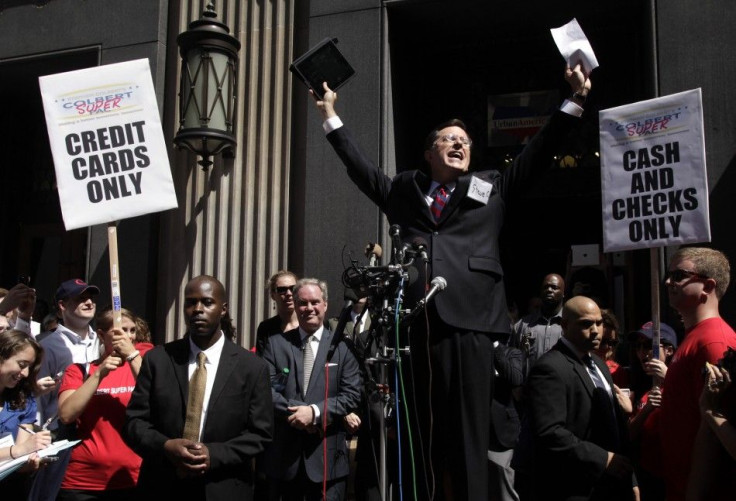FEC Gives Thumbs Up For Colbert Super PAC

Stephen Colbert, who hosts Comedy Central's The Colbert Report, has received approval from the Federal Election Commission (FEC) to form his own Super PAC.
The approval allows Colbert to raise unlimited funds to support or oppose candidates in the 2012 elections through independent expenditures such as TV ads.
In May, Colbert, a well-known American political satirist, writer and comedian, had requested FEC to grant a media exemption for coverage of his political action committee, ColbertPAC, on The Colbert Report.
The FEC voted 5-1 in June to grant the Colbert Report a media exemption, which allows unlimited donations of airtime and show resources to promote the Colbert Super PAC without requiring disclosure to the FEC.
“I am a Super PAC, so can you,” Colbert told crowd that gathered outside the commission building after the meeting.
“Now some people have cynically asked is this some kind of joke. Well I for one don't think that participating in a democracy is a joke, Colbert told the crowd. I don't think that wanting to know what the rules are is a joke.
The approval for Super PAC allows Colbert to collect unlimited money from individuals, political committees, labor organizations and corporations. The Committee would not need to disclose as in-kind contributions costs incurred by Comedy Central’s parent company Viacom, Inc. (NYSE:VIA).
I don't accept the status quo, he said. I do accept Visa, Mastercard or American Express.
However, Viacom should disclose any aid it gives Colbert for political activities outside Colbert’s TV show.
In the United States, a political action committee, or PAC, is the name commonly given to a private group organized to elect political candidates or to advance the outcome of a political issue or legislation. When an interest group, union, or corporation wants to contribute to federal candidates or parties, it must do so through a PAC.
The election commission said that candidates and party officials may solicit contributions for super PACs, but those contributions could not exceed the $5,000 limit for donations that applies to traditional political action committees.
Generally, PACs represent less than 30 percent of total contributions in U.S. Congressional races, and considerably less in presidential races.
Colbert added he himself didn't know what he'd be doing with his unrestricted super PAC money, but he said “give it to me let’s find out.”
Meanwhile, Super PACs is the result of a 2010 Supreme Court ruling in Citizens United case that lifted many spending and contribution limits. The groups can also mount the kind of direct attacks on candidates that were not allowed in the past.
Since last year's midterm election, 26 new super PACs have sprung into existence, filing organizational paperwork with the FEC, according to a report from Open Secrets. The total number of super PACs registered with the FEC since they came into existence in July is now up to 108.
Republican presidential candidate Mitt Romney's former deputy finance director created three super PACs late this month, a Center for Responsive Politics examination of federal records indicates.
The news super PACs, called Jobs for Iowa, Jobs for Florida and Jobs for South Carolina are each focused on notable states, each essential to a successful run for the Republican presidential nomination given the early dates of their presidential primary and caucus contests.
It is unclear whether the new super PACs are designed to alone support Romney's presidential candidacy in what is an increasingly crowded GOP field.
However, Super PACs are not allowed to coordinate directly with candidates or political parties and must disclose their donors. Still, direct contributions are prohibited.
Watch the below video to see the statement of Colbert on Super PAC approval.
© Copyright IBTimes 2024. All rights reserved.











